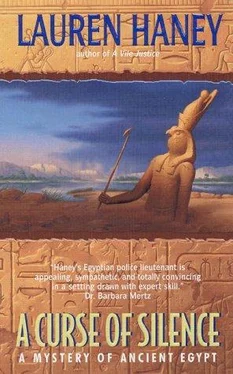Lauren Haney - Curse of Silence
Здесь есть возможность читать онлайн «Lauren Haney - Curse of Silence» весь текст электронной книги совершенно бесплатно (целиком полную версию без сокращений). В некоторых случаях можно слушать аудио, скачать через торрент в формате fb2 и присутствует краткое содержание. Жанр: Исторический детектив, на английском языке. Описание произведения, (предисловие) а так же отзывы посетителей доступны на портале библиотеки ЛибКат.
- Название:Curse of Silence
- Автор:
- Жанр:
- Год:неизвестен
- ISBN:нет данных
- Рейтинг книги:3 / 5. Голосов: 1
-
Избранное:Добавить в избранное
- Отзывы:
-
Ваша оценка:
- 60
- 1
- 2
- 3
- 4
- 5
Curse of Silence: краткое содержание, описание и аннотация
Предлагаем к чтению аннотацию, описание, краткое содержание или предисловие (зависит от того, что написал сам автор книги «Curse of Silence»). Если вы не нашли необходимую информацию о книге — напишите в комментариях, мы постараемся отыскать её.
Curse of Silence — читать онлайн бесплатно полную книгу (весь текст) целиком
Ниже представлен текст книги, разбитый по страницам. Система сохранения места последней прочитанной страницы, позволяет с удобством читать онлайн бесплатно книгу «Curse of Silence», без необходимости каждый раз заново искать на чём Вы остановились. Поставьте закладку, и сможете в любой момент перейти на страницу, на которой закончили чтение.
Интервал:
Закладка:
They stopped often, sampling fruits and vegetables, tast ing herbs and spices, peeking into wide-mouthed jars of dried beans and peas and grain. They examined lengths of cloth, laughed at performing monkeys, delighted in toys with movable parts, ate braised beef and fresh bread, tested for sharpness the edges of spearpoints and daggers. Amon ked let down his guard, openly delighted with all he saw.
Horhotep, so full of himself he failed to notice, abandoned all pretense of restraint and sneered at the thriving market, the exotic people, the wondrous products.
As they walked away from the market, Horhotep stopped to study the massive fortified wall that protected the lower city, then his eyes darted toward the busy stalls and colorful crowd. A scowl of extreme distaste marred his features.
“Tell me, Commander Woser, why have you expended so much time and effort renovating the peripheral wall when you allow inside that wall every wretched two-legged crea ture from upriver and off the desert?”
“This is the largest market on the frontier, Lieutenant.”
Woser, who had evidently had enough of the man’s inso lence, accented the rank, making it sound not quite respect able. “It draws more people than any other along the river, from the border of Kemet at Abu to the unknown reaches of the south. Products of every type are exchanged, each of value in its own way. Should we ask those who come to display their wares in a place unprotected from those who take what they want, giving nothing in return?”
“If the market is worth protecting-and I have my doubts-why have you not repaired the spur walls on the citadel? Do you wish the heart of the fortress to collapse while you struggle to preserve its skin?”
Bak leaned toward Nebwa and muttered, “Does he never listen to anyone other than himself?”
“Repairs are made when and where necessary.” Woser’s voice was taut, betraying the effort he made to give a civil answer. Swinging away, he led them down a lane between two warehouses. “Come, we’ve a skiff awaiting us at the harbor. If you’re to rejoin your caravan before nightfall, we must hurry on to the island fortress.”
“How can you say the market isn’t worthy of protec tion?” Bak demanded of Horhotep.
Amonked gave his adviser a curious look. “Yes, Lieu tenant, explain yourself. I, too, am puzzled.”
Horhotep flung a self-important smile Bak’s way. “From what I’ve seen, products exchange hands here with no toll ever being paid. If the same objects were carried across the frontier by respectable merchants, each ship or caravan would hand over a substantial amount, giving our sovereign her rightful share of the merchandise.”
“Tolls are collected at the outer gate,” Woser said. “True, our demands are modest. Their purpose is not to increase the wealth of the royal house but to remind all who enter of the debt of gratitude they owe our sovereign for allowing them to trade here.”
“Why settle for a pittance when we could have far more?”
“Increasing the toll would reduce the number of people who bring goods here to trade,” Bak said, “allowing no gain to our sovereign and a loss to this city and this land. They would move their business elsewhere, probably to an island south of Semna. What they’d lose in safety, they’d gain in profit, for they’d pay no tolls at all.”
“Must I give you a history lesson, Lieutenant?” Nebwa, the son of a soldier, had grown to manhood in the fortress
Lauren Haney of Kubban several days’ sail north of Buhen and knew the reasons behind many decisions obscured by the passage of time. “Iken has been a market city for many generations, from the time of Khakaure Senwosret. When our sover eign’s father, Akheperkare Thutmose, marched up the river with his army and conquered the lands far to the south, he ordered that this market remain open. Not only does it lure products seldom offered to traders, but it brings people to gether in a way not possible for the more formal trading expeditions.”
“To survive and thrive, the market must be kept safe,”
Bak added, thinking of Amonked’s mission. “The reno vated wall discourages raiders, the army holds them at arm’s length.”
“I must admit this city intrigues me.” Amonked stepped over a skinny black dog sprawled across the lane. “Far more than Buhen or any other place I’ve seen so far, it emphasizes the importance of trade to this region.”
Woser’s fast pace and the heavily populated lanes for bade further discussion, allowing Horhotep time to marshal his rebuttal. As they walked out on the northernmost of two long, stone quays, he sidled up to Amonked. “I see no tactical reason for the army to continue its occupation of this garrison. The local people, as sullen as they are, pose no real threat, and I’m convinced the raiding tribesmen we’ve heard so much about are mere figments of the imag ination.”
“I can take no more of that pompous ass,” Nebwa mut tered. “I’ll meet you here when you return from the island.”
He swung around and stalked off, giving Bak no time to plead that he remain.
Amonked watched him go. After bending so far as to request that Nebwa and Bak accompany the inspection party, he had to be displeased by the troop captain’s abdi cation, but as usual his face gave no hint of his feelings.
“You call that structure a fortress. I call it four walls with no purpose.” Horhotep climbed out of the skiff and stood on the quay, looking eastward toward the island from which they had come, impossible to see beyond a closer rocky prominence. “No man of good sense would station soldiers there.”
“If I’m not mistaken,” Amonked said, clambering out of the vessel, “it proved itself quite useful when King Amon Psaro came to Iken some months ago.” He glanced at Bak, who waited in the prow while Woser climbed out. “Did you not prevent at that time what could have been a most serious incident, Lieutenant?”
“Yes, sir.”
As Nebwa had said, Thuty had sung their praises. But in such detail? Or had Amonked, before he left the capital, read all the reports sent to Waset by the viceroy? A bur densome task. Necessary if a man wished to make a wise decision. A decision that would affect the well-being of thousands of men and women. Would a man be that con scientious if his sole intent was to carry out his sovereign’s wishes?
“The rapids here are fearsome.” Minkheper leaped onto the quay with practiced ease. “Is this the upper limit of those we looked upon yesterday from the watch station?”
“As far as I know.” Scrambling out of the skiff, Bak looked toward Woser for an answer, but the commander had hurried on up the quay to meet Nebwa, leaning against the mooring post closest to shore. “I’ve had no chance to travel farther south.”
“Even with the floodwaters at their highest, I’d not enjoy taking a ship through those rocks.”
After Sennefer climbed out of the boat, the three of them strode up the quay behind the inspector and his adviser. A stiff breeze had come up and the warmth of the early af ternoon sun was filtered through a dusty haze blowing off the desert from the northwest. A faint smell of braised lamb roused Bak’s hunger.
“How has the fortress held up?” Nebwa asked, his good humor restored. “Is it overgrown already with tamarisk and weeds?”
“It’d take some clearing,” Bak admitted, “but Woser could still shelter a king there if need be.”
Nebwa lowered his voice and nodded toward Horhotep.
“What did the visiting swine have to say about it?”
“He…” A movement deep in the shadow of the ware house closest to the quay caught Bak’s eye. He spotted a bow and glimpsed an arrow taking flight. “Look out!”
Читать дальшеИнтервал:
Закладка:
Похожие книги на «Curse of Silence»
Представляем Вашему вниманию похожие книги на «Curse of Silence» списком для выбора. Мы отобрали схожую по названию и смыслу литературу в надежде предоставить читателям больше вариантов отыскать новые, интересные, ещё непрочитанные произведения.
Обсуждение, отзывы о книге «Curse of Silence» и просто собственные мнения читателей. Оставьте ваши комментарии, напишите, что Вы думаете о произведении, его смысле или главных героях. Укажите что конкретно понравилось, а что нет, и почему Вы так считаете.












